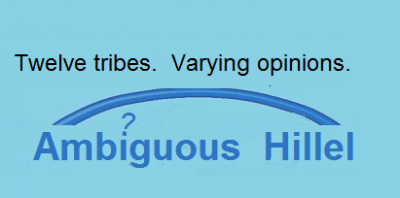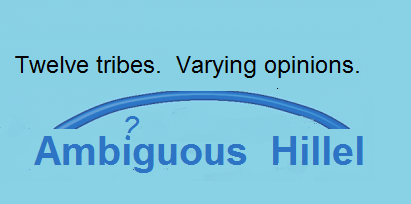Feeling caught up in the pressure to align themselves with either the liberal Open Hillel movement or the nascent reactionary Safe Hillel movement, Jewish students at West Virginia International University met and decided to start a new movement in response: Ambiguous Hillel.
“We really had no other option,” explained WVIU Hillel president Jason Scheingross. “Our Hillel contains some students who support Open Hillel, some who support Safe Hillel, and many more who aren’t sure. We started this movement as a compromise in the hopes of making our Hillel a place where all students can feel comfortable. We’re not going to host just any speaker or publicly reject Hillel’s Israel guidelines, but we might engage students in conversations that will make them uncomfortable. I hope other Hillels will follow our lead,” he said.
According to its press release, the students at WVIU Hillel felt tired of being caught in between the “Open” and “Safe” Hillel movements, as seen in this excerpt:
Across the country, Hillel’s Israel guidelines are either being callously cast aside or else vigorously defended and embraced. We do not believe this is the true face of young American Jews. We, the founders of Ambiguous Hillel, are unsure of our relationship to the Israel guidelines and wish at this point to neither flat-out reject nor uncritically accept them and want to ensure that Hillel remains a place where Jewish students like us will always feel welcomed.
The students are currently in the processes of starting an online petition in support of the Ambiguous Hillel movement and launching a Web site that will outline the organization’s goals, link to related news, and provide resources to help other Hillel become Ambiguous.
The organizers are hopeful that their movement will gain traction elsewhere. According to Jessica Rosenberg-Rosen, Shabbat and holidays chair of WVIU Hillel, many others have expressed interest. “Everyone I’ve spoke to at other Hillels seems to really relate to not wanting to pick a side between the Open and Safe Hillel movements,” she said. “So there seems to be a lot of support for our ideals on the ground. Now whether any of them will actually have the courage to make themselves officially Ambiguous remains to be seen.”
Rosenberg-Rosen said she is unsure if the move will affect Hillel’s funding. Donors were not available for comment.

Still, the movement faces difficulties, even at WVIU. “Hillel shouldn’t be ambiguous, it should be certain,” Garrett Applebaum, Hillel social justice chair and president of WVIU’s Students for Justice in Palestine chapter said. “While you’re sitting on the fence, Palestinians are suffering. That’s only going to stop once Hillel students make up their minds that this is wrong and start inviting anti-Israel speakers to campus.” Applebaum said he is still deciding whether this decision will cause him to step down from his position on the Hillel student board.
Expert opinion is divided as to whether the Ambiguous Hillel movement is good or bad for the Jews. Dr. Barry R. Worrystein, a leading sociologist of American Jewry, sees this movement in light of larger trends. “This seems to go against a strong trend we’ve been seeing towards Jewish students having strong opinions on things,” he said. “Though the self-described ‘ambiguousness’ these students are displaying may also reflect a growing general ambivalence among Jews towards their heritage that, if left unchecked, may lead to the end of over 6,000 years of Jewish continuity. To back up my opinion, I would like to quote the Pew Survey,” he added.
Others, like Professor Richard I. Mehman, a noted author and Betty P. and Bob Kesef Senior Professor of Jewish History at WVIU, doesn’t see it in such dire terms. “It seems like they’re just turning the status quo into a movement. I don’t really see what this is meant to accomplish. Also, I receive $25 from The Forward each time I mention the Pew Survey,” he said.
But for most Jewish students at WVIU, in spite of all the hubbub around Ambiguous Hillel, life goes on as usual “They’re still going to have free dinners on Friday nights, though, right?” every other student interviewed for this piece said.
Derek M. Kwait graduated from the University of Pittsburgh and is editor in chief of New Voices.


